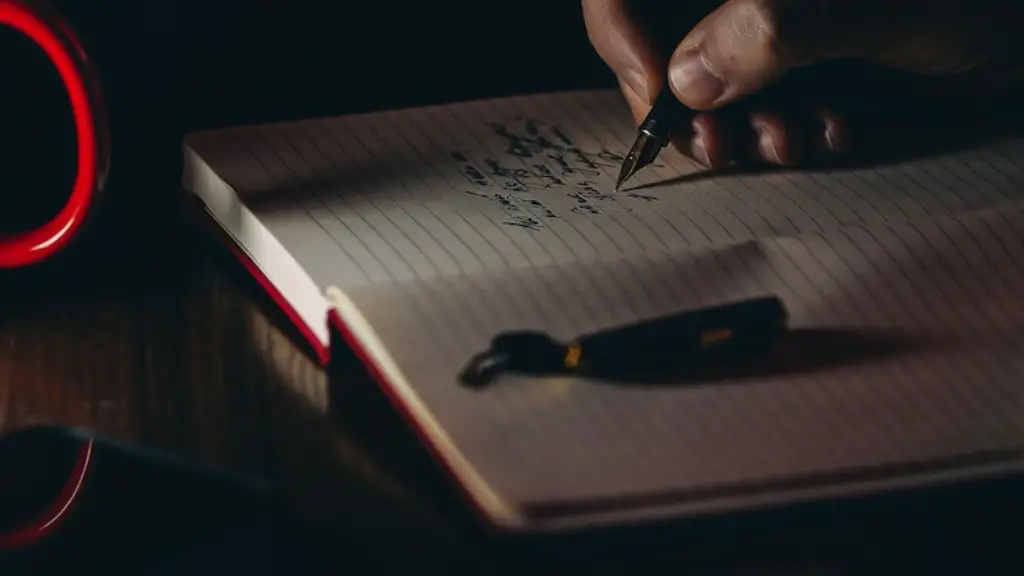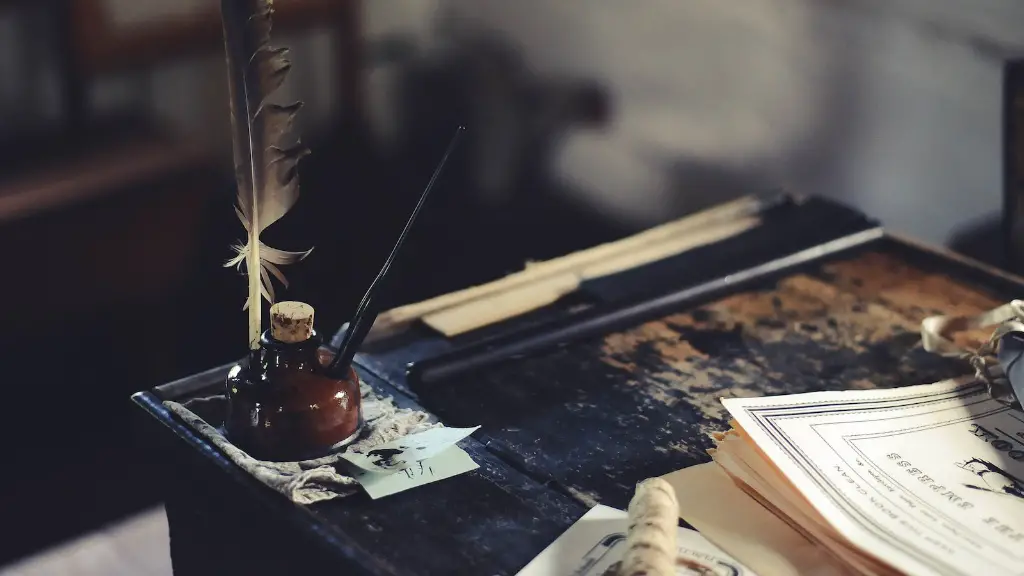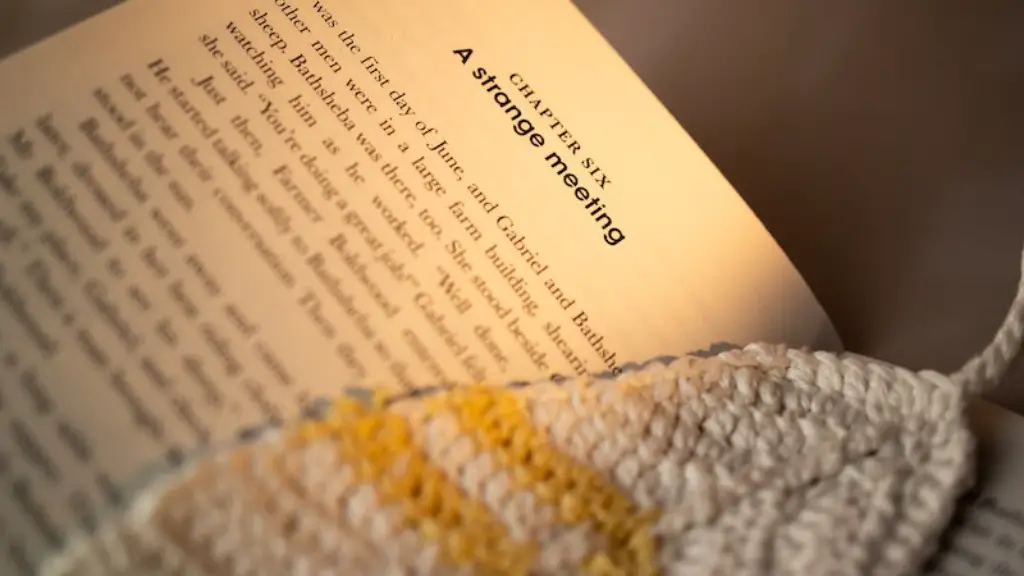Poetry is defined as a written expression of emotion or feeling, using imaginative and often rhythmic language. A poem can be about virtually any topic, from love and romance to more complex subjects such as the meaning of life. The most common forms of poetry are lyric, narrative, and dramatic. While poetry has no particular length, common features such as meter, rhyme, and alliteration, help to create an overall pattern or structure.
For many people, poetry is a way to express themselves in a unique and powerful way. Poems can communicate complex thoughts and bring language to life as an art form. They can be short and quiet, or loud and unrestrained. They can be vivid and inspiring, or filled with sadness and longing. Many of the greatest poets throughout history have used beautiful imagery and meaningful metaphors in their work.
The beauty of poetry is that there is no exact structure or formula. Different styles and forms of poetry use different devices, such as rhyme, alliteration, and meter. Poetic forms include sonnets, odes, haikus, and limericks. To be considered a poem, a piece of writing must also be composed of language designed to convey meaning and emotion. For example, prose is often used to tell stories, while poetry is more about exploring complex emotions and ideas.
The beauty of poetry is that it can be interpreted in many different ways. A poem might be saying something particular to the person who wrote it, but another person might interpret it in a totally different way. This ability to be interpreted in a multitude of ways is one of the things that makes poetry so popular.
Poetry has been around for thousands of years, used by many cultures from across the world. Throughout history, poetry has been used to inspire people, to tell stories, and to express emotions. Ancient poets such as Homer, Sappho, and Virgil have used finely crafted language to explore many of the same things that modern poets are still exploring today.
In modern times, poets are pushing the boundaries of what poetry can be by experimenting with new ways to create and to express ideas through words. Some modern poets are using technology to create digital art, combining visuals and sound with words to make poetry even more powerful.
Although some poems have been written by famous poets, anyone can create poetry. There are no rules and no right or wrong way of expressing feelings and emotions. All that is needed is the willingness to put words together in such a way that the listener or reader can appreciate the power of the poem.
Forms of Poetry
Poetry comes in many different forms and styles, each with its own unique characteristics. Some of the most common forms are lyric, narrative, and dramatic. Each type of poem uses language and structure to convey meaning.
Lyric poetry is expressive, often written in first person, and often composed of rhyming lines. Some of the most famous lyric poets of all time are William Wordsworth, Edgar Allan Poe, and Christina Rossetti. Narrative poetry is a story in poetic form, which often includes characters and a plot. Examples of narrative poems include Beowulf and The Odyssey. Dramatic poetry, on the other hand, is intended to be performed and recited to an audience. William Shakespeare’s plays are well known examples of this form of poetry.
There are also many other styles of poetry, from haiku and limericks to free verse. Haikus are short poems with three lines that follow a specific syllable count. Limericks are usually humorous and have five lines with a distinct rhyme scheme. Free verse is poetry without any kind of formal structure, which gives poets a great deal of freedom to express themselves.
Writing Poetry
Writing poetry is an excellent way to express ideas, feelings, and to explore one’s own creativity. Poetry requires skill and practice, but writing a poem is often easier than one might think. The first step is to choose the topic, then to begin playing with words and structure.
When writing poetry, it can help to think about the key words or ideas that should be included in the poem. Considering the theme of the poem and the emotions that are being expressed will also help with the writing process. Other important considerations are poetic devices such as rhythm and rhyme, which can bring depth and texture to the poem.
When writing, it’s important to let the poem come naturally, without forcing it. Even though there are certain rules and conventions for traditional forms of poetry, writing can be a lot of fun and a great way to tap into creativity. There are also no “wrong” ways to express oneself through a poem, and exploring different styles, forms, and techniques can be a great way to learn.
Publishing Poetry
Publishing poetry requires a different approach than publishing writing such as fiction and non-fiction. Most print publications such as magazines and newspapers prefer shorter poems and often do not commission longer works. When submitting a poem to a publisher, it is important to consider the agreement between the author and the publisher, as well as to understand their rights and responsibilities.
In addition to magazines and newspapers, there are many other ways to publish poetry online. Social media sites, blogs, and websites all offer great opportunities for poets to share their work. There are also many online magazines and journals specifically devoted to publishing poetry. If publishing a book of poetry, self-publishing is usually the best route. By self-publishing, poets are able to control the creative process, retain ownership, and receive a larger share of the profits.
The Poetic Voice
The ‘poetic voice’ is often hard to define but is, in simple terms, the personal style of the poet. It is the unique way in which a poet expresses themselves, and it can be incredibly powerful. From the words that are used to the way that they are arranged, the poetic voice is what sets poetry apart from other art forms.
The poetic voice is often an extension of the poet’s own voice. It is the way in which the poet conveys their thoughts and feelings, and in some cases, it is the only way in which they can communicate. Poetry allows a poet to be vulnerable with the reader and to let their voice resonate through the words.
The poetic voice is influenced by the poet’s influences, experiences, and surroundings. It is also shaped by the poet’s choice of words, syntax, and stylistic devices. To write with a strong poetic voice, poets must become aware of their own thoughts and feelings and be willing to delve deep into their subconscious. The poetic voice is often lyrical, contemplative, and emotionally charged.
The Role of Poetry
Poetry has many important roles in society. It can be used to inspire, to tell stories, and to explore difficult emotions. It can also be used to teach, to motivate, and to challenge the status quo. For many people, writing and reading poetry is an escape from the everyday world.
In addition to providing an emotional release, poetry also encourages readers to think critically about the world around them. Poetry can act as an agent of social change, a bridge between cultures and a force of unification. Through its exploration of human nature, poetry can also provide a source of hope and optimism.
This emotional and intellectual power of poetry makes it an inevitable part of the human condition. It is a way for us to express our deepest thoughts and feelings in a unique and beautiful way. Whether we are writing a poem or reading one, poetry is a powerful art form that can be transformative.
Modern Poetry
In modern times, the internet and social media have opened up a world of possibilities for poets. Technology has enhanced the poem writing process by providing access to a wide range of resources and tools. The use of audio and visual elements can also add another dimension to the poem, making it more engaging and dynamic.
The rise of online communities has also enabled poets to connect with like-minded people from around the world. Writing and reading poetry has become more accessible, with social media and digital content making it possible to engage with the poetic community on a global scale.
Poetry is evolving and taking on new forms as a result of modern technology, and it is now more accessible than ever before. Writers have the opportunity to experiment and explore with words and technology to create truly unique and powerful works of art.





